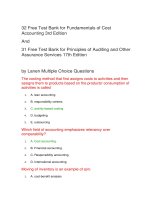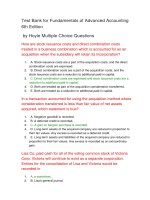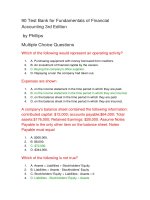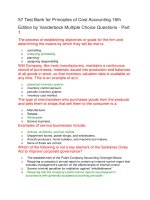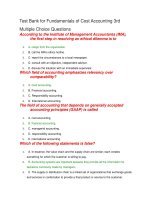Test bank for fundamentals of cost accounting 3rd
Bạn đang xem bản rút gọn của tài liệu. Xem và tải ngay bản đầy đủ của tài liệu tại đây (64.01 KB, 12 trang )
Test Bank for Fundamentals of Cost Accounting 3rd
Multiple Choice Questions
According to the Institute of Management Accountants (IMA),
the first step in resolving an ethical dilemma is to
1.
A. resign from the organization.
2.
B. call the IMA's ethics hotline.
3.
C. report the circumstances to a local newspaper.
4.
D. consult with an objective, independent advisor.
5.
E. discuss the situation with an immediate supervisor.
Which field of accounting emphasizes relevancy over
comparability?
1.
A. Cost accounting.
2.
B. Financial accounting.
3.
C. Responsibility accounting.
4.
D. International accounting.
The field of accounting that depends on generally accepted
accounting principles (GAAP) is called
1.
A. cost accounting.
2.
B. financial accounting.
3.
C. managerial accounting.
4.
D. responsibility accounting.
5.
E. international accounting.
Which of the following statements is false?
1.
A. In essence, the value chain and the supply chain are similar; each creates
something for which the customer is willing to pay.
2.
B. Accounting systems are important because they provide all the information for
decisions commonly made by managers.
3.
C. The supply or distribution chain is a linked set of organizations that exchange goods
and services in combination to provide a final product or service to the customer.
4.
D. Eliminating nonvalue-added activities always reduces costs without affecting the
value of the product to customers.
5.
the accounting system does not provide ALL of the information needed
The financial plan of the revenues and resources needed to
carry out activities and meet financial goals is called
1.
A. performance measure
2.
B. benchmarking
3.
C. budgeting
4.
D. responsibility center
5.
E. lean accounting
Costs that change in response to a particular course of action
are
1.
A. differential costs
2.
B. cost-benefit analysis
3.
C. activity-based costs
4.
D. cost drivers
Moving of inventory is an example of a(n)
1.
A. cost-benefit analysis
2.
B. value-added activity
3.
C. activity-based cost
4.
D. nonvalue-added activity
The system that allows firms to target profitable customers by
assessing customer revenue and costs is called
1.
A. customer relationship management
2.
B. distribution chain
3.
C. total quality management
4.
D. cost of quality
5.
E. enterprise resource planning
The JKL Restaurant had sales revenues and food costs in 2009
of $800,000 and $600,000, respectively. In 2010, JKL will
be introducing a new menu item that will generate
$100,000 in sales revenues and $40,000 in food costs.
Assuming no changes are expected for the other food
items, the differential operating profit for 2010 is
1.
A. $260,000.
2.
B. $100,000.
3.
C. $60,000.
4.
D. $40,000.
Information technology that links the various processes of the
company into a single comprehensive information system
is called
1.
A. customer relationship management
2.
B. distribution chain
3.
C. total quality management
4.
D. cost of quality
5.
E. enterprise resource planning
Which of the following is a nonvalue-added activity?
1.
A. Product design
2.
B. Customer service
3.
C. Research and development
4.
D. Rework of defective items
The cost accounting system that minimizes wasteful or
unnecessary transaction processes is
1.
A. performance measure
2.
B. benchmarking
3.
C. budgeting
4.
D. responsibility center
5.
E. lean accounting
The primary reason for adopting total quality management
(TQM) is to achieve (CIA adapted)
1.
A. reduced delivery time.
2.
B. reduced delivery charges.
3.
C. greater customer satisfaction.
4.
D. greater employee participation.
5.
E. better managerial decisions.
Which of the following is not one of the overarching ethical
principles of the Institute of Management Accountants
(IMA) Code of Ethics?
1.
A. Competence
2.
B. Responsibility
3.
C. Honesty
4.
D. Objectivity
5.
E. Fairness
According to the Institute of Management Accountants (IMA),
the final step in resolving an ethical dilemma is to
1.
A. resign from the organization.
2.
B. call the IMA's ethics hotline.
3.
C. report the circumstances to a local newspaper.
4.
D. consult with an objective, independent advisor.
5.
E. discuss the situation with an immediate supervisor.
In 2010, the Turnkey Company had consulting revenues of
$1,000,000 while costs were $750,000. In 2011, Turnkey
will be introducing a new service that will generate
$150,000 in sales revenues and $60,000 in costs.
Assuming no changes are expected for the other
services, the differential operating profit for 2011 is
1.
A. $250,000.
2.
B. $150,000.
3.
C. $90,000.
4.
D. $60,000.
Which of the following is not normally considered part of the
value chain?
1.
A. Research and development
2.
B. Purchasing
3.
C. Administration
4.
D. Distribution
5.
E. Customer service
The costing method that first assigns costs to activities and
then assigns them to products based on the products'
consumption of activities is called
1.
A. lean accounting
2.
B. responsibility centers
3.
C. activity-based costing
4.
D. budgeting
5.
E. outsourcing
Continual process of measuring a company's own products,
services or activities against competitors' performance is
1.
A. performance measure
2.
B. benchmarking
3.
C. budgeting
4.
D. responsibility center
5.
E. lean accounting
The set of activities that transforms raw resources into the
goods and services of an organization is called:
1.
A. Value chain.
2.
B. Supply chain.
3.
C. Demand chain.
4.
D. Cost-benefit analysis.
Which of the following activities would not be considered a
value-added activity?
1.
A. Production
2.
B. Marketing
3.
C. Accounting
4.
D. Distribution
Cost drivers are (CMA adapted)
1.
A. activities that cause costs to increase as the activity increases.
2.
B. accounting techniques and practices used to control costs.
3.
C. accounting reimbursements used to evaluate whether performance is proceeding
according to plan.
4.
D. a mechanical basis, such as machine hours, computer time, or factory square
footage, used to assign costs to activities.
Which of the following is not a key financial manager in an
organization?
1.
A. Chief financial officer
2.
B. Treasurer
3.
C. External auditor
4.
D. Controller
5.
E. Cost accountant
Which of the following is not one of the basic standards of the
Institute of Management Accountants (IMA) Code of
Ethics?
1.
A. Competence
2.
B. Confidentiality
3.
C. Honesty
4.
D. Integrity
5.
E. Credibility
The process of creating a formal plan and translating goals into
a quantitative format is (CMA adapted)
1.
A. budgeting.
2.
B. benchmarking.
3.
C. cost-benefit analysis.
4.
D. value-added analysis.
5.
E. activity-based costing.
Having one or more of the firms' activities performed by another
firm or individual in the supply or distribution chain is
called
1.
A. lean accounting
2.
B. responsibility centers
3.
C. activity-based costing
4.
D. budgeting
5.
E. outsourcing
The just-in-time (JIT) methods of production focuses on
1.
A. increasing sales revenue.
2.
B. reducing inventories.
3.
C. increasing customer service.
4.
D. reducing operating expenses.
5.
E. increasing product quality.
In 2010, the MoreForLess Company had revenues of $2,000,000
while costs were $1,500,000. In 2011, MoreForLess will be
introducing a new product line that will generate $200,000
in sales revenues and $160,000 in costs. Assuming no
changes are expected for the other products, the
differential operating profit for 2011 is
1.
A. $540,000.
2.
B. $200,000.
3.
C. $160,000.
4.
D. $40,000.
An accounting system that collects financial and operating data
on the basis of the underlying nature and extent of cost
drivers is (CMA adapted)
1.
A. full-absorption costing.
2.
B. activity-based costing.
3.
C. variable costing.
4.
D. benchmarking.
A management method by which the organization seeks to
excel on all dimensions of quality is called
1.
A. customer relationship management
2.
B. distribution chain
3.
C. total quality management
4.
D. cost of quality
5.
E. enterprise resource planning
Managers do not make decisions about future events based on:
1.
A. Perfect information.
2.
B. Estimated information.
3.
C. Actual information.
4.
D. Financial information.
5.
E. Cost information.
The system that identifies the costs of producing low-quality
items is called
1.
A. customer relationship management
2.
B. distribution chain
3.
C. total quality management
4.
D. cost of quality
5.
E. enterprise resource planning
True - False Questions
The value chain comprises activities from research and
development through the production process, but does
not include activities related to the distribution of
products or services.
1.
True
2.
False
A person who makes unethical decisions in their personal life is
likely to make unethical decisions in their professional
life.
1.
True
2.
False
It is more important for financial accounting information to be
comparable between firms than to be useful for
managerial decision-making.
1.
True
2.
False
Budgeting is primarily used to determine year-end bonuses
based on managerial and organizational performance.
1.
True
2.
False
Managers face ethical situations on a daily basis, while
accountants face them infrequently.
1.
True
2.
False
Cost accounting information can be used by managers to
defraud customers, creditors, and owners.
1.
True
2.
False
It is important that the manager assigned to lead a
responsibility center be held accountable for its
operations.
1.
True
2.
False
Administrative functions are not included in the value chain
because they are implicitly included in every business
function.
1.
True
2.
False
Financial accounting information is designed for decisionmakers who are directly involved in the daily management
of the firm.
1.
True
2.
False
A cost driver is a variable that causes costs.
1.
True
2.
False
Customer satisfaction is an example of a non-financial
performance measure.
1.
True
2.
False
Managers are responsible for the costs incurred to achieve the
targets set during the budgeting process, but not the
resources consumed to achieve those targets.
1.
True
2.
False
Activity-based costing (ABC) is a management tool that focuses
on the continuous improvement of all dimensions of a
business.
1.
True
2.
False
A cost can be differential for one particular course of action and
non-differential for another course of action.
1.
True
2.
False
All nonvalue-added activities can be eliminated, once they are
identified.
1.
True
2.
False
Ethical behavior depends more on a firm's code of conduct than
the individual's personal beliefs.
1.
True
2.
False
A responsibility center can be a department, division, or
segment, but not a subsidiary of the parent company.
1.
True
2.
False
Cost information used for one managerial decision could be
irrelevant for another managerial decision.
1.
True
2.
False
Cost accounting information developed for managers to use in
making decisions must comply with generally accepted
accounting principles (GAAP).
1.
True
2.
False
Benchmarking is an on-going process that compares a
company's products or services with the best levels of
performance from other firms.
1.
True
2.
False
